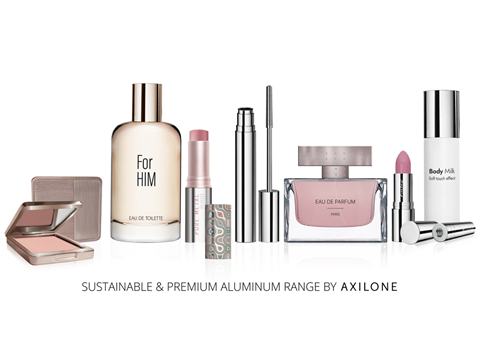
Cosmetic packaging manufacturer Axilone and aluminium supplier Aludium have teamed up to introduce an aluminium to the market that is said to reduce the carbon footprint by over 24%, compared to the average carbon footprint for primary aluminium sold in Europe.
The companies state that when compared to primary aluminium produced in China, it results in an average carbon footprint reduction of 76%, citing the 2018 European Aluminium Environmental profile report and The International Aluminium Institute.
Axilone says it will utilize Aludium’s ‘certified and independently verified’ low-carbon aluminium for its cosmetic packaging components. ECO P7 Aluminium apparently generates less than 7 tonnes of CO2 equivalent per tonne of aluminium from raw material extraction through to delivery, achieved through a controlled production process and the selection of low-carbon primary aluminium.
The two companies say the GHG emissions produced by this aluminium are verified by a third party and certified in accordance with ISO-14067-1:2018 and the Greenhouse Gas Protocol standards.
“We see it as our responsibility to identify more environmentally friendly aluminium and continuously work to optimize the life cycle of our packaging. This is why we are committed to introducing more sustainable materials to the market, with lower CO2 emissions,” explains Martin Haye, strategic & development director of Axilone Group.
“As a European leader in the beauty packaging sector, we must offer aluminium alloys that are both high-quality and sustainable, with a reduced carbon footprint. Partnering with Aludium’s ECO P7 aluminium allows us to meet this growing market demand,” comments David Gregorio, director of Axilone Metal.
In related news, Beiersdorf incorporated a minimum of 80% recycled aluminium into its NIVEA Creme tin back in July, a move anticipated to cut around 8,000 tonnes of carbon dioxide equivalent (CO2e) emissions from the company’s operations between now and 2025. The transition into recycled aluminium coincides with Beiersdorf’s sustainability agenda, with the company intending to reach net zero by 2045.
More recently, Novelis announced its targets for the end of 2030, including an average of 75% recycled aluminium content and investing in circularity for the aluminium industry. It currently claims to feature an average of 63% recycled content in its products and plans to raise this by 12% by the end of 2030.
If you liked this story, you might also enjoy:
The ultimate guide to the Packaging and Packaging Waste Regulation in 2024
How are the top brands progressing on packaging sustainability?
Sustainable Innovation Report 2024: Current trends and future priorities
Everything you need to know about global plastic sustainability regulation














No comments yet